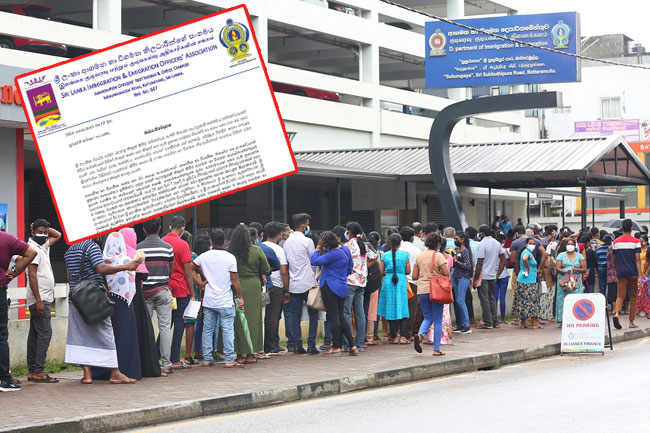
The Sri Lanka Immigration and Emigration Officers’ Association has issued a statement addressing the ongoing passport crisis in the country, citing administrative mismanagement and a lack of adequate planning as key contributors for the issue.
According to the association, statements issued by other parties on the matter have often been contradictory and misleading, compelling them to clarify the real situation and advocate for immediate action to resolve the crisis.
The association highlighted that the Department of Immigration and Emigration has a critical role in issuing passports that meet international standards, as mandated by the Immigration and Emigration Act. Despite continuous immigration and emigration services provided around the clock, including during emergencies, passport issuance has been disrupted by inefficiencies that began earlier this year and persist today, the statement added.
The association detailed the following factors as having caused the crisis:
1. Not making purchases on time.
2. Not forecasting citizen demand accurately.
3. Not having proper stock of passports
4. Indiscreetly starting an online application process earlier and abandoning it after it failed, without making the existing conditions efficient and expeditious
5. Decision-making by only a few people in the top administration (Controller General / Additional Controller General Deputy Control and Information Technology Controller)
6. Non-consideration of departmental regular staff members in the decision-making process and arbitrary implementation of decisions.
7. Implementing projects without a pilot project or actual deficiency studies.
8. Not doing follow-up tasks
9. Imprudent implementation of the opinions and orders of the political authority.
10. Prioritizing private interests over public service.
Furthermore, the Immigration and Emigration officers pointed out lapses in proactive measures that the authorities had made, such as,
1. Not having introduced a formal system to answer the inquiries made by telephone.
2. Non-attendance of duty by the responsible officers and at least not attending the phone calls.
3. Not obtaining the support that could have been obtained through the media.
4. Not recognizing and not implementing a method of providing successful answers even to the clients who come to the department premises and make inquiries.
5. Not taking steps to acquire the knowledge and experience of the experienced, regular employee community.
6. Imprisoning the employee community in an oppressive duty environment.
7. Making the duties that were done in a satisfactory and pleasant environment unsatisfactory and unpleasant
8. Immediate implementation of unfair and illegal conditions and development of unequal treatment.
9. Due to the reduction of employee commitment by working to meet the needs of the minority instead of giving the rights of the majority, the overall performance is reduced and the public service is hindered.
The association also pointed to significant missteps in ensuring the availability of blank passports. After the COVID-19 pandemic, the demand for passports rose, but the department did not increase its stock accordingly.
Although the Court of Appeal approved the acquisition of 750,000 blank passports, supply delays from the new vendor have exacerbated the crisis, the statement highlighted, noting “For example, only 7,000 blank passports were delivered on October 21, far short of demand, with a modest increase to 45,000 by October 27.”
“This supply shortfall has made it difficult for the department to provide concrete answers to the public or media, further aggravating public dissatisfaction”, the association added.
The association expressed disappointment that higher administration has not been transparent with government leaders or the public. They warned that political loyalty-driven appointments under past political authorities have contributed to arbitrary decision-making.
Moreover, the statement alleged that it is regrettable the authorities of the Immigration and Emigration Department have not revealed the true situation related to the issuance of passports, even to the minister in charge of the subject, who is engaged in an extremely responsible role that has to cover a 1/3 of the entire role of the government, even though the department has all the data and information.
To address these issues, they urged for a formal investigation to hold all responsible individuals accountable and to prioritize efficient solutions over private interests.
The Immigration and Emigration Officers’ Association concluded its statement by calling on departmental authorities to act promptly and end the passport crisis, pledging their support for the betterment of public service in Sri Lanka.
-Ada Derena